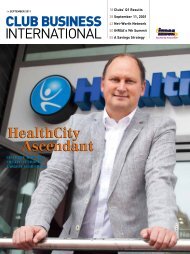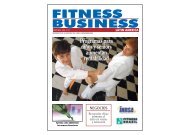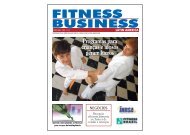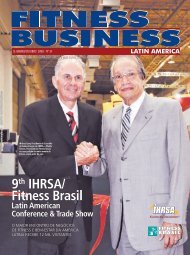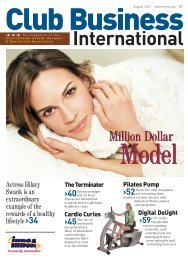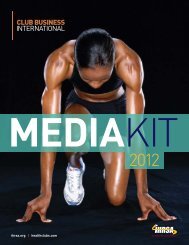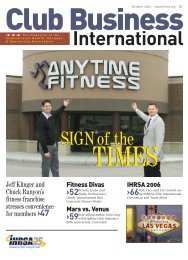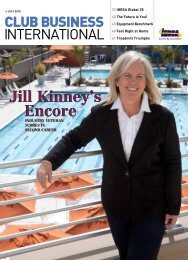Innovations - IHRSA
Innovations - IHRSA
Innovations - IHRSA
Create successful ePaper yourself
Turn your PDF publications into a flip-book with our unique Google optimized e-Paper software.
“Clubs, themselves, first have to be aware<br />
that exercise has a tremendous effect on<br />
the brain.”<br />
CBI: Earlier, you spoke about the<br />
impact of exercise on cognition<br />
as one ages. What, specifically,<br />
are the mental benefits of exercise<br />
for individuals over 50?<br />
JR: If someone has been inactive up<br />
to the age of 50, but gets involved in a<br />
moderately intense exercise program,<br />
studies show that they’ll push back<br />
cognitive decline by 10 to 15 years.<br />
Other research suggests that you can<br />
cut the risk of Alzheimer’s disease<br />
by up to 50%. Women, by the way,<br />
derive more benefits of this sort from<br />
exercise than do men, especially<br />
after menopause.<br />
CBI: Do you think that most<br />
physicians truly understand and<br />
appreciate how exercise affects<br />
health, lifestyle, and, in particular,<br />
the brain?<br />
JR: No, I don’t think they understand<br />
it all, quite yet. They need to be better<br />
educated about these issues. Now,<br />
medical students are demanding<br />
more information about nutrition,<br />
and I think that exercise is beginning<br />
to get some play. I spoke about<br />
exercise and Parkinson’s disease,<br />
and brain health, in general, at<br />
Stanford University this summer.<br />
In November, here at Harvard, we<br />
| CBI Interview |<br />
had a three-day conference called<br />
Active Doctors, Active Patients,<br />
designed to encourage doctors to<br />
prescribe exercise to their patients.<br />
It was sponsored by the new Institute<br />
for Lifestyle Medicine at Harvard.<br />
The interest is building, but slowly.<br />
CBI: Do you think physicians<br />
should be “prescribing” exercise<br />
to their patients?<br />
JR: Yes, prescribing exercise is key<br />
to changing the healthcare tide. I also<br />
think many family practice physicians<br />
should have a “fitness nurse,” whose<br />
job would not only be to prescribe<br />
exercise, but, in addition, to check<br />
data from a pedometer, heart-rate<br />
monitor, or body-composition scale<br />
on a regular basis. The benefits would<br />
be enormous! —|<br />
– Patricia Amend, Pamend@aol.com<br />
www.ihrsa.org | APrIL 2010 | Club Business International 27



